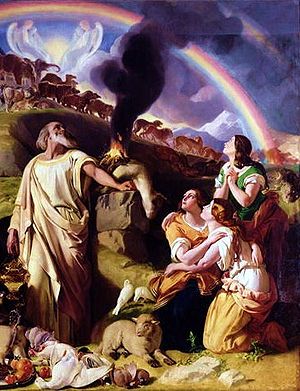 Image via Wikipedia
Image via WikipediaIn Genesis 15: 10 -17, Abram brought the animals God requested and cut them in half. Then, after God further elaborated upon the covenant he was establishing with Abram, a supernatural event occurred - a blazing torch materialized and passed between the pieces! In a mystical way, the elements of a covenant were defined: life, death, blood, passing between the pieces of flesh, and an agreement. Here, basically God provided everything - all that Abram had to do was believe God; to take God at his word; to believe that what he had promised he would bring about.
First God made a covenant with Noah. Now, in Genesis 15, God talks to Abram, a 75 year old, childless man and tells him that his descendants will be as numerous as the stars and that the land, (Genesis 15:18) which spanned from the river of Egypt to the Euphrates, will belong to them. However, the first thing God told Abram was not to be afraid and to regard God as his protector and reward. So, God made a promise and Abram's part was not to be afraid of what exactly, it doesn't say. Since God said that he would protect him, maybe Abram was afraid of raiding marauders, etc. God does say Genesis 15:1, that his protection is Abram's "great reward".
Although Abram seemed content to wait for God to fulfill his promise regarding descendants, it appears that his wife, Sarai became impatient and urged Abram to father a child through her maid servant, Hagar. From the very beginning of this pregnancy, though God is recorded as supporting Hagar and her son Ishmael, he did not designate him as the steward of God's covenant.
Twenty five years passed before God appeared to Abram again. This time, God changed his name to Abraham which means Father of Many nations. God also told him that he and his descendants must keep the covenant of circumcision because the covenant made in his flesh is an everlasting covenant (Genesis 17:3). Here again there was a cutting of the flesh; a separation of one part of the flesh from another; a selection of one son over another.
So, every male 8 days old and older had to be circumcised. Of paramount significance is that Abraham immediately circumcised his entire household. He took God at his word and acted on it. It's as though the circumcision was the way Abraham was signing on the "dotted line". By acting so quickly, Abraham demonstrated that he understood the significance of this covenant. Abraham understood that God chose another son, yet to be born to him and Sarah, who would be a son of the promise; a son miraculously conceived; a son God named Isaac (Genesis 17:19); the son with whom the everlasting covenant would be established.
As we see God talking to Abraham and see how his relationship with God grew, his comprehension of his covenant with God unfolded and developed.
Abraham, because he trusted God, began to understand, that God's promise would be realized gradually, over long periods of time. Abraham learned that man's way of making something happen is not God's way, i.e. God spoke with Hagar, Ishmael's mother, and promised her that her descendants would be too numerous to count. Not chosen for God's covenant promise, Ishmael was prophesied to live in hostility with everyone.
After the household circumcision, Abraham is left to wait for the birth of Isaac, for God to fulfill his promise.
Blue Letter Bible. "Dictionary and Word Search for barah (Strong's 1262)". Blue Letter Bible. 1996-2010. 26 Aug 2010. < http:// www.blueletterbible.org/lang/lexicon/Lexicon.cfm?
Strongs=H1262&t=KJV >












